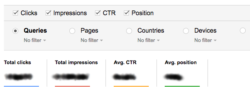SEO changes pretty frequently. However, there are some things that just don’t change.
I’ve said it before and I’ll say it again: “implied expertise, or “implied SEO” as I call it, is the biggest issue I continue to identify in my SEO audits of clients and prospects who are newly serious about purposefully driving more traffic.
Here’s what I mean by “implied SEO”: you’re trying to rank for keywords that you “think” exist on your site, but they don’t actually exist in any sort of strategic fashion.
Let me give you an example.
I recently did an audit for an Educational Consultant, and she was baffled about why she wasn’t ranking better for a particular term. She was clearly an expert in her field, with an impressive 19 books under her belt.
On paper, she had all of the right pieces in place:
- Her web designer had done actual keyword research (not fake keyword research where people “guess” and make up keywords). I mean, I saw numbers and data in a spreadsheet people!
- They had a keyword mapping spreadsheet of what keywords were mapped to which pages (YES!)
- Yoast was set up and the plugin was filled out with a focus keyword pulled from the spreadsheets referenced above
They came to me to help gain understanding about why things weren’t working.
My Process for Quickly Diagnosing SEO Issues
When I opened up Google Search Console (GSC) to look at this consultant’s Search Analytics query data, the tell-tale sign of “implied SEO” was there: the keywords that represented her topical field of expertise were MIA.
Listen: if your primary, high-value keywords aren’t showing up in your Search Console data at all, that is a problem and an indicator of a priority item that needs to be addressed.
Sure enough, as soon as I started exploring around on several key website pages to look for her keywords, they were nowhere in sight.
Bottom line: you can’t rank for a keyword if you don’t use it strategically on your website.
At the risk of sounding sexist, if we were having a debate about whether Google is a “he” or a “she,” I can most certainly tell you it is a “he.”
Just like most men, Google does not get “hints.” You can’t be subtle or clever or coy.
You have to be crystal clear. Anything less than that will sail right over Google’s head.
Capiche?
(#thestruggleisreal)
Are You Suffering from Implied SEO?
I surprisingly encounter this issue all the time. Marketers and business owners who are fairly new to SEO come to me baffled about why they’re not ranking for certain terms. And when I go to their website to see how and where they’ve used their most important keywords, they’re harder to find than a Pepsi in Atlanta.
Before I go much further, I’d be remiss if I didn’t add these two items:
- For the love of all that’s holy, here’s what I’m NOT SAYING TO DO. Please do not plaster your target keywords all over your website on every page. I said strategic keyword use. That means one keyword (and its close family of variants) per URL. (This is on-page optimization 101)
- This issue of “implied SEO” is consistent with businesses who are new-ish to SEO. Obviously, if you have a mature marketing program and you’ve been in the game for awhile, you can most likely safely ignore this article. However, just to be safe, go to your GSC data and do a search for the target keywords that are most important to you right now. (your keywords and business priorities do evolve and your SEO may not have kept up.)
So back to my educational client above, the #1 thing I advised her to do was counteract the “implied” SEO issue.
Don’t assume your expertise is obvious.
Google is not going to read your mind and magically rank you for keywords.
Here is a quick checklist if you’d like to self diagnose to see if this is occurring with your site:
- Open up Google Search Console (GSC) or go through Google Analytics if you have your accounts integrated
- Wait – you don’t have GSC? That’s your first order of business as you have to have this free account if you’re serious about SEO
- Navigate to your “Search Analytics” reports under “Search Traffic”
- Toggle on Impressions, CTR, and Position

- Expand the rows from the default 50 to 500
- Toggle on Impressions, CTR, and Position
- Do a ctrl+f (control + find if you’re on a PC) and search for your keywords. Do they exist? If not, then you’re suffering from “Implied SEO.”
- Now – open up your website and start incorporating your keywords and on-page elements into your page.
SEO often is as simple as this. The foundation of your results starts here.
A Word to the Wise
Perhaps you are one of those lucky marketers who is magically ranking for for a keyword/query/phrase that you don’t actually use on your site in your copy. But this is the exception rather than the rule.
And with all things, of course there are outliers that will prevent this simple fix from being effective. Say for example, you have technical issues preventing expected SEO results, which can also be diagnosed fairly easily in most cases. (that’s an article for another day!) Or you’re in a very competitive field, and quality backlinks are going to be necessary. It will take time to see results if you work on it.
Truly, you’d be surprised how often people are trying to rank for keywords they’re not actually using on their site in their copy.
SEO |